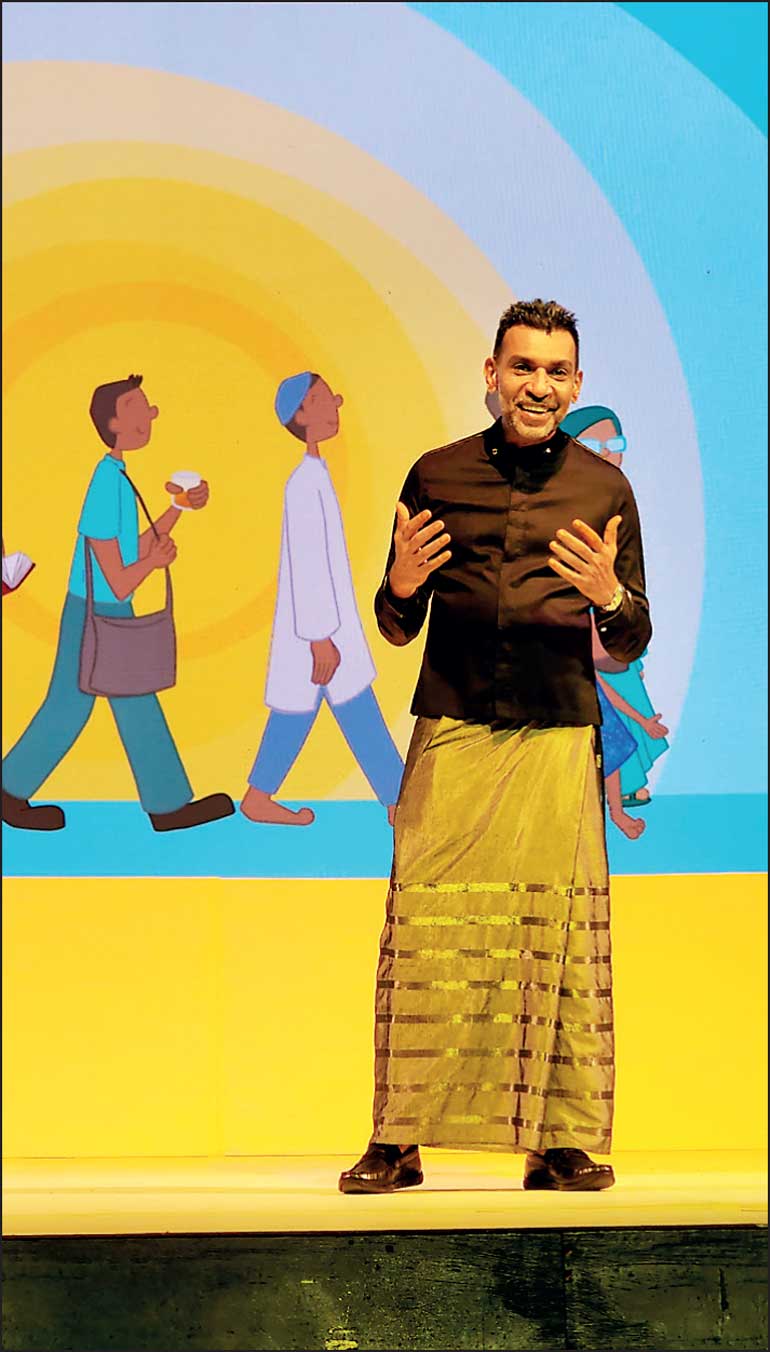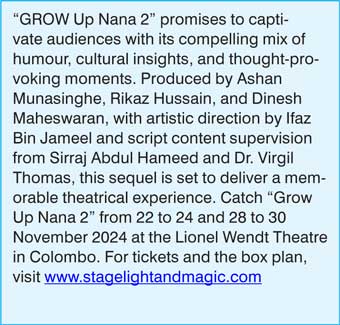Tuesday Feb 24, 2026
Tuesday Feb 24, 2026
Thursday, 21 November 2024 00:05 - - {{hitsCtrl.values.hits}}

Feroze Kamardeen
 By Michelle Therese Alles
By Michelle Therese Alles
Following the resounding success of “Grow Up Nana” last year, Feroze Kamardeen is back with “Grow Up Nana 2”, a sequel set to captivate audiences once again. Known for his unique ability to blend humour with meaningful social commentary, Kamardeen explores new themes while building on the relatable narratives that resonated so deeply with theatre-goers. This highly anticipated production promises an unforgettable mix of laughter, introspection, and fresh perspectives. The Daily FT caught up with Feroze to dive into his creative process and the vision behind this latest production.
Q: Can you walk us through your creative process in writing and performing “Grow Up Nana 2”? Were there any challenges or particularly memorable moments during its development?
A: My creative process for “Grow Up Nana 2” began with brainstorming broad topics and writing short snippets or jokes centred on these themes. These initial drafts formed the foundation, but the script evolved significantly through collaboration. We bounced ideas back and forth, conducted initial readings, and refined the content based on feedback.
The first version of this play submitted to the Public Performance Board was revised multiple times over three months. By the time of the final submission, it was essentially a new script. During rehearsals, we analysed which jokes and scenes resonated, refining them further or cutting them out if they didn’t work.
One particularly challenging moment arose over a contentious scene that divided the team. After extensive debates, we sought external opinions before making a final decision. Moments like these highlight how dynamic and collaborative the process is, ensuring every element aligns with the play’s vision and impact.
As a result, the script I perform on stage is often a far cry from the first draft.
Q: How does “Grow Up Nana 2” build on the themes and narratives of the original play? Are there specific moments or stories you felt needed further exploration in this sequel?
A: In “Grow Up Nana 2”, I am aiming to expand on the ideas introduced in the first play while exploring new angles and issues. The sequel revisits some of the key moments and concepts that resonated strongly with audiences in “Grow Up Nana 1”, offering a deeper dive into topics like misunderstood perspectives and unique cultural quirks. Additionally, it introduces fresh stories and themes inspired by audience feedback, which let me explore these elements in greater depth, introducing a story that’s familiar yet with a refreshing sense of novelty.
Q: The first “Grow Up Nana” received a standing ovation for its relatability and humour. How do you plan to keep the sequel just as engaging and impactful for your audience?
A: Creating a sequel like “Grow Up Nana 2” comes with its own set of challenges, especially following the success of part 1. We were incredibly grateful for the audience’s reception of the original, but with part 2, the humour takes a slightly different direction, with certain elements that may feel unexpected or even unconventional. As with all my plays, I aim to create moments that are memorable, funny, and thought-provoking. This script includes a diverse blend of humour—from clever wordplay to slapstick comedy—and deeper, reflective scenes that invite the audience to consider societal issues. There’s even a subtle call for change woven into the narrative. Overall, the play offers a wide range of emotions and experiences, and I believe the audience will find it both engaging and impactful.
Q: After a break between the performances of “Grow Up Nana” and its sequel, what message do you hope this leaves for your audience?
A: “Grow Up Nana 2” has given me the opportunity to explore deeper messages, while retaining the comedy of the first play. I have included a mix of light-hearted moments and darker humour, along with calls to action that I hope will inspire reflection and dialogue, long after the curtain falls.
For me, this play is about breaking barriers. It showcases that the Muslim community can laugh at itself, which I see as a mark of maturity. At the same time, it offers non-Muslims a chance to learn more about our traditions and practices in a relatable way. It is about creating connections—building understanding both within and beyond our community.
The journey from “Grow Up Nana” to its sequel has also been one of personal growth. As a playwright, I have gained more confidence in crafting content that resonates, and as a performer, I’ve learned how to engage audiences more effectively. This sequel is not just an extension of the first; it’s a reflection of these learnings and a step forward in storytelling. My hope is that it leaves everyone with a good laugh, a meaningful takeaway, and a sense of shared humanity.